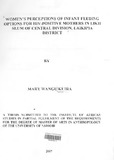| dc.contributor.author | Kuira, Mary W | |
| dc.date.accessioned | 2013-05-10T09:53:50Z | |
| dc.date.available | 2013-05-10T09:53:50Z | |
| dc.date.issued | 2007 | |
| dc.identifier.uri | http://erepository.uonbi.ac.ke:8080/xmlui/handle/123456789/21242 | |
| dc.description.abstract | This study examined women's perceptions of infant feeding options for HIV-positive
mothers in Likii slum of central division, Laikipia district. It was designed to examine how
cultural norms and beliefs as well as health knowledge influence women's perceptions of
infant feeding options for HIV-positive mothers. The study also investigated the
relationship between a woman's socio-economic status and her perceptions towards infant
feeding options for sero-positive mothers.
The study was guided by the socialization theory since people's perceptions are to a larger
extent moulded through the socialization process as individuals experience different agents
of socialization in their lifetime. Data was collected using structured interviews, focus
group discussions and key informant interviews. Quantitative data was analysed using the
Statistical Package for Social Sciences (SPSS) and presented in tables of frequencies and
percentages. On the other hand, qualitative data was organized, summarized and presented
in verbatim quotes and selected comments.
The study findings suggest that the women in the area have a high knowledge of HIV
transmission through breastfeeding and that it could be prevented. However, the level of
knowledge of the infant feeding options for HIV-positive mothers is low. This in turn
affects their perceptions of the options negatively. Cultural norms and beliefs, which also
negatively affect the women's perceptibns of the options, include breastfeeding for long
durations and mixed feeding. In addition, wet-nursing or heat-treating breast milk is not
culturally acceptable. The women's socio-economic status also had an influence on these
infant-feeding options.
The study thus recommends the creation of awareness on all the options to reduce the
HIV/AIDS stigma, and for mothers to have a variety of choices when they find themselves
HfV-positive. Efforts should be directed not only at women, but also at those who
influence women's decisions about infant feeding. If replacement feeding is to be advised,
the supply of breast milk substitutes should be given priority since feeding advice will
depend on their availability. Efficie-nt distribution is essential if free or subsidized breast milk substitutes are to be offered, to ensure they reach eligible mothers. Resources should
-vbe
spent on promoting exclusive breastfeeding for the population as a whole, so that it will
be easier for HIV -infected women who choose the option to practise it without stigmatising
themselves as being HIV-positive. | en |
| dc.description.sponsorship | The University of Nairobi | en |
| dc.language.iso | en | en |
| dc.subject | Women's perceptions of infant feeding Options for HIV-positive mothers | en |
| dc.subject | Likii Slum of central division, Laikipia District | en |
| dc.title | Women's perceptions of infant feeding Options for HIV-positive mothers in Likii Slum of central division, Laikipia District | en |
| dc.type | Thesis | en |
| local.publisher | Institute of anthropology, gender and African studies | en |

